- Home
- Jayne Anne Phillips
Fast Lanes Page 5
Fast Lanes Read online
Page 5
“Where did you come from?”
“Thurman, I came from where I’m going.”
“I mean in the beginning, like Poland or Scandinavia.”
“Wales. But there, in West Virginia, since the 1700s. A land grant. So much land they parceled it out for two hundred years of ten-children families, and only sold the last of it as my father was growing up.”
“Sold it to who?”
“The coal companies. Pennsylvania and New York coal companies.”
“Uh-huh.” He adjusted the rearview mirror. “Why aren’t you back there mobilizing against strip mining?”
“Mobilizing? You make it sound like a war.” I turned on the radio, and turned it off. “I guess it is a war—New York hippies against New York coal companies.” I looked away from him, out the window. “I don’t have any excuse, I just wanted to get out.”
“You know West Virginia is the only state left where there are no nuclear reactors?” He took a drag on his cigarette and smiled at me across the seat.
“They couldn’t put a reactor there,” I said. “The land would open like a boil, like an infected Bible, and swallow it.” I caught his eye and smiled back. “Impressive. You’re up on your eco-lit.”
“I’m a good hippie carpenter.”
“There are no hippies anymore. There’s a fairy tale about working-class visionaries.”
“Just a fairy tale? No vision in the working class?”
“Vision everywhere. But in the real working class, vision is half blind. It’s romantic to think they really know—”
“You don’t think they know?” He flicked his cigarette out the window and raised his voice. “They know—they just don’t talk about it. My grandfather was an Irish Catholic plumber who died of cirrhosis. He used to sit in his chair while the news was on the radio and fold his newspaper into squares. Then he’d unfold it and roll it into a tube, a tight tube the width of a black snake. He’d whack it against the arm of the chair in four-four time, while the announcer kept going and my skinny grandmother grated cabbage in the kitchen by the plates.” He checked the mirror and pulled out around a cattle truck. “They knew plenty, sweetheart. You don’t know what you’re talking about.”
“Don’t call me sweetheart, and I didn’t say they weren’t perceptive or frustrated. I said their isolation was real, not an illusion. They stayed in one place and sank with whatever they had. But us—look at us. Roads. Sensation, floating, maps into more of the same. It’s a blur, a pattern, a view from an airplane.”
“You’re a real philosopher, aren’t you? What do you want? You want to sink, righteous and returned to your roots? Is that it?”
“I can’t.”
“Can’t what?”
“Sink. I don’t know how.”
“Oh, Christ. Will you shut up and light that joint before we pull into Dallas?”
I took the joint out of his cigarette pack and looked for matches.
“Here,” he said, and threw them at me. “No wonder you live alone and sleep on floors. You’re ponderous and depressed. Nothing is any worse than it’s ever been.”
“No,” I said, “only more detached.”
“Detachment is an ageless virtue. Try a little Zen.”
“I am,” I said, and lit the joint. “I’m living in Zen, highway Zen, the wave of the future.”
He didn’t laugh. We pulled into Dallas and Thurman finished the joint at a roadside park in sight of three Taco Bells, a McDonald’s, and a Sleepytime Motel. He squinted behind the smoke, drawing in. “What does your dad do?” he asked.
“Retired.”
“OK. What did he do?”
“Roads. He built roads.”
“Highways?”
“No. Two-lane roads, in West Virginia. Hairpin turns.”
The joint glowed in his fingers. Dusk had fallen, a gray shade. The air was heavy and hot, full of random horns and exhaust. I could see the grit on Thurman’s skin and feel the same sweaty pallor on my face.
“What is your father like?” I asked him.
He exhaled, his eyes distanced. “My father is seventy-one. Lately he’s gone a little flaky.”
We sat in silence until the dope was gone. Thurman turned on the ignition. “You’ll have your own bedroom at my parents’ house,” he said, “and I sure hope your sheets aren’t too heavy.”
• • •
The house was a big old-fashioned saltbox on an acre of lawn, incongruous among the split-levels, badly in need of paint. Drainpipes hung at angles from the roof and the grass was cut in strange swaths, grown tall as field weeds in patches. An old Chevy station wagon sat on blocks in front of the garage. Thurman and I sat in the driveway, in the cab of the Datsun, looking.
“They’ve gotten worse, or he has. I’ve hired kids to cut the grass for him and he won’t let them on the property.”
“Did they know we were coming?”
“Yes.”
The front door opened and Thurman’s mother appeared. She was small and thin, her arms folded across her chest, and it was obvious from the way she peered into middle distance that she couldn’t really see us.
“You go first,” I said, “she’ll want to see you alone.”
He got out of the truck and approached her almost carefully, then lifted her off the ground in an embrace. She didn’t seem big enough to ever have been his mother, but a few minutes later, as she looked searchingly into my face, her handshake was surprisingly firm.
The inside rooms smelled of faded potpourri and trapped air despite the air-conditioner. Only the smallest downstairs rooms seemed lived in: the kitchen, a breakfast nook, a small den with a television and fold-out couch made up as a bed. The large living room was empty except for a rocking chair in the middle of the naked floor. The room had been dismantled and holes in the plaster repaired; three large portraits in frames of uniform size were covered with painter’s cloths and propped against the wall. Above them were the faded squares of space where they’d hung.
“Oh,” I said, “you’re painting.”
“Well.” She surveyed the room. “We were going to paint three years ago, but we never did.” She smiled.
Upstairs the hall was dusty. Plaster had fallen off the walls in chunks and exposed the wooden wallboards. Bits of newspaper and chips of paint littered the floor; the master bedroom was clean but unused, and the other bedrooms seemed deserted: furniture pushed to the center of the floor, beds filmed with a fine dust.
“You take this room,” Thurman said, “I’ll be across the hall.” He picked up a broom and began sweeping off the mattress. “I’ll get you some sheets.”
I said nothing.
He put the broom down. “Look, it was me who got the living room ready for painting—two years ago, not three. I’d hired painters to do that room and the outside; my father called them and told them not to come.” Thurman stepped over to the window, looking down at the lawn through streaked glass. “But that grass.… Still, he’s known I was coming for six weeks, maybe he planned this whole scenario. He won’t let me buy him a power mower or do any chores for him. We fight about it every time I come home. This time I’m not fighting.
“Why is he mad at you?”
“Because I bailed out eleven years ago. Eleven years is a lot of mad.” Thurman looked up at me. “And don’t be surprised if he doesn’t talk to you. His hearing isn’t really so bad but he pretends to be deaf. He’ll act busy the whole time we’re here.”
We sat at the edge of the concrete patio in deck chairs.
“My father was famous. He was known as the best high school football coach in the history of the state of Texas. Universities offered him jobs, but he wouldn’t move his family, he wouldn’t leave this house.” Thurman shook the ice in his empty glass and looked levelly toward the old wooden garage. His father stood in the open doorway with the push mower, frowned down at the turning blades as he pushed the contraption into the grass of the side lawn. “I knew he was famous from the time I was a ki
d. And my brothers were famous, six and eight years older than me, both of them drafted to play ball at SMU after starring on his teams. And later I was famous, but not as famous as them. I played on my father’s last team and we went to the play-offs; he was sixty years old.”
The mower made its high scissoring whirr as the old man shoved it back and forth. The slender wooden handle was as gray and weathered as barn board.
“His kids aren’t going to cart him off anywhere, and no one in this posh neighborhood had better try it either,” Thurman said. “He was here first. And there are still people around who remember my father. If he wants to let his house fall down, or set it on fire or blow it up, I guess he’s entitled.”
I watched Thurman’s father. He’d barely acknowledged my presence, though he’d discussed the mower with Thurman as they both knelt to wipe the blades clean with a rag. The old man was lean and stooped but he didn’t seem fragile.
Thurman picked up the pint bottle between our chairs and colored the ice in his glass with bourbon.
“Did you win?” I asked him.
“What?”
“Win the championships, the last ones.”
“By the skin of our teeth. We were behind and tried a long last-resort run as the clock ran out. I played end and blocked for our quarterback, a fast little Mexican named Martinez. I was the last one with him, thought it was over and took two of their backs as Martinez jumped the pile of us. I wanted to knock myself out, too much of a coward to stay conscious if we lost. I came to ten minutes later with a concussion, and we’d won.”
“Was your father standing over you?”
“No, he was up there accepting the trophy. Then he came and balanced it on my chest as they lifted me onto the stretcher—big gold monstrosity with three pedestals that multiplied and looked like infinity. I wasn’t seeing too clearly. That was 1964; things were just beginning to focus.” He looked over at me. “You were about twelve years old then.”
I looked back at him. “You didn’t go to SMU.”
“Not a chance. Football nearly killed me. I couldn’t read print for two weeks.” He sank lower in the deck chair, stroking the lush grass with his foot. His legs were long and muscular and fair. “If I’d hit an inch more to the right, I’d have bought myself a box. But even without the concussion, I was sick of it. I went to Colorado and ski-bummed and ran dope up from Mexico and went to school, did the Peace Corps trip. Didn’t see my father for years.”
“Why didn’t the war get you? The concussion?”
“No. Knees. Got my brother though, the middle one. Killed him. He didn’t even have to go. He was almost twenty-eight years old and enlisted, like a fool. My father thought it was the right thing to do. They shipped him over there and killed him in nine weeks. Nineteen sixty-eight. Saw my father at the funeral. Kept saying to me, ‘Barnes was on drugs, wasn’t he. They’re all on drugs over there. He wouldn’t have died otherwise, he was an athlete. Still worked out every day. Drugs killed him.’ I said, ‘Dad, the war killed him. War doesn’t give a shit about athletes.’ I did two tours in the Peace Corps after that. I just wanted to stay the fuck out of the country.”
“Thurman … Thurman?” His mother’s voice wavered out across the lawn. I turned and saw her at the kitchen window. “Supper,” she called, “come on in now.…” Her every phrase was punctuated with a silence.
Thurman didn’t move.
“Do you come back here often?” I asked. “How much do you see them?”
“Once a year, maybe twice. He’s getting old. There’s not much more time to figure it out, any of it.”
I couldn’t sleep, I crept down the stairs to get a glass of water. Disoriented, I turned the wrong corner into the dim living room and found myself facing the shrouded portraits. I knelt beside the last. If I looked now, no one would know; carefully, silently, I pulled the cloth away. First, a shine of glass, then, in moonlight, the features of a face. I thought it was Barnes, the dead brother, serious and young in his black suit, already marked—but no, the eyes—it was Thurman. I stared, puzzled.
“High school graduation,” he said behind me. “We were all eighteen.” The rocking chair creaked. “What are you doing up?”
“I couldn’t sleep.”
“No one sleeps much in this house.”
“Who else is awake?”
“My mother. I heard her in the kitchen. When I came downstairs, she went back to bed. That’s the way we do it around here.” He nodded at the closed door of the little den. “She seems to have had a few drinks.”
“Is that usual?”
“Who’s to say? Her drinking progresses, like everything.” He took a drag off his cigarette, and the glow of the ash lit his face for an instant. “She forgets things when she drinks. Conveniently.”
“I doubt it’s just convenience.”
“What else would it be?”
I shrugged. “Pain?”
Thurman sighed. “You never know when to keep your mouth shut. Do you think I want to sit here in this house at three in the morning and talk about pain?”
“No.” I could see him very clearly in the darkness. I moved closer and touched his forehead. “You talk, Thurman, and let me know when I should speak. I’ll say whatever you want.”
He stood, and put his arms around my shoulders and held me. We turned to go upstairs, then Thurman paused. We heard broken words, a murmuring. He stepped closer to the den and stood listening, then pushed the door softly open. His mother stood near us in her bathrobe, an empty glass in her hand. She seemed unaware of us and looked up slowly. The dim little room was crowded with furniture and smelled faintly of bourbon. Thurman’s sleeping father was in shadow.
“Mom, you should be in bed. You might fall.” He walked over to her and took the glass. “I’ll put this in the kitchen for you.”
She stopped Thurman and grabbed his wrist. “Listen,” she said slowly, in a tone of confidence, “Barnes never answers a letter, never calls. Where is he?”
Thurman led her to the bed. “Don’t pull that on me.”
“She isn’t,” I whispered, “she really—”
Now she was sitting on the edge of the mattress. Thurman put his hands on her shoulders and shook her once, gently. She looked him in the eye. “Who is that girl?” she said.
“A friend of mine, Mom, you met her earlier today. Here, lie down before you wake Dad.”
She said nothing and clutched Thurman’s hand; he leaned closer involuntarily. Her eyes widened, her face caught in the light of the one lamp. For a moment I could see how he favored her, how she must have looked at twenty-five: the clear, ruddy complexion, the cast and blue directness of the eyes, the thick auburn hair, maybe worn in a braid to her waist. This close, their faces nearly touched. Her profile was a broken, feminine version of his. I turned away.
“Mom, lie down.”
“Don’t you be leaving again now.”
“Go to sleep, get some rest.”
“I don’t sleep. Don’t you be leaving.”
“Thurman,” I said. I heard him straighten. Her body shifted in the bed, then he was beside me in the hallway, pulling their door shut. He stood breathing quietly, listening. No sound. The mottled living-room walls lightened as our eyes took in the dark again. Colors of dun and gray, cracked. In one corner, patches of missing plaster were ragged star shapes where the boards showed through. I reached for him.
“I shouldn’t come here,” he said.
“It’s all right.”
He stood there, looking at their closed door. “Who saves who?” he said.
I pulled his head down, close to me, touching him, his face. “Let’s sleep outside.”
I got some blankets and we spread them in the yard. The acacia bushes were a thick bank, bulbous and shadowy, smelling of sweet dust.
Then we hit New Orleans. Checked into a motel. Went to that bar where everyone was dancing.
What happened was scary and stupid, and whirling and sick and drunkenly predicta
ble, and in the cards from the first. Afterward, things were different, and Thurman had no illusions about saving me. He must have worked things out himself after he left the bar alone, while he was waiting for me all night in that motel, the aqua drapes moving over the air vents behind the blue glow of the television. I remember almost all the motel rooms, and I remember that one especially, the big Zenith console TV and those cheap drapes blue as fired gas. In seven hours, Thurman could have watched three movies and twelve sets of commercials. He left me at the bar at two A.M. and I pulled into the motel parking lot in a taxi at nine. He was just drawing tight the ropes of the tarp and the door to the room was standing open. I got in the truck after exchanging one look with him, and nothing else passed between us until Georgia, when we got in the lake.
Then, we kept going.
“Don’t drive in the fast lane unless you’re passing.” Thurman, his voice gravelly with wakefulness.
“Why not? I pass everything anyway, so I might as well stay in the fast lane. I like fast lanes.”
“Oh, you do. Well. Someone even faster is going to come roaring up and eat your ass. How will you like that?” He switched off the radio. “God dammit, will you listen to me for a minute?”
I looked at him at once, and kept driving.
“Pull the truck off the road,” he said.

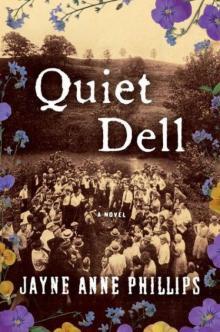 Quiet Dell: A Novel
Quiet Dell: A Novel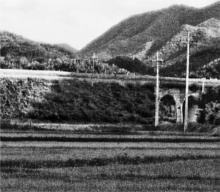 Lark and Termite
Lark and Termite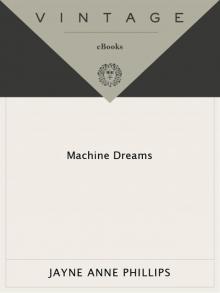 Machine Dreams
Machine Dreams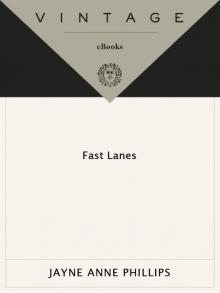 Fast Lanes
Fast Lanes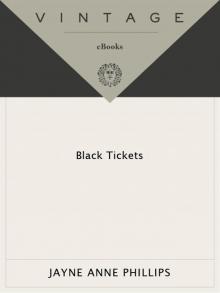 Black Tickets
Black Tickets